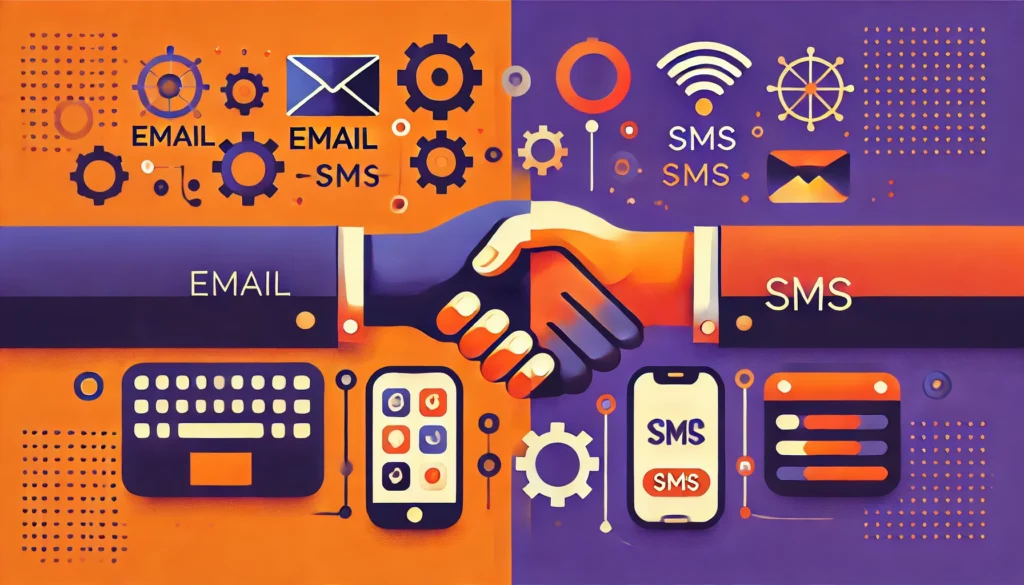Email vs. SMS Marketing: The Best Path for Your Business
SMS
Businesses are constantly seeking the most effective ways to connect with their audience. Email marketing has long been a staple, known for its ability to deliver detailed, personalized content. Meanwhile, SMS marketing is gaining traction due to its immediacy and high engagement rates. Here’s a comprehensive look at the pros and cons of each, helping you decide which might be best for your business.
Understanding Email Marketing
Email marketing is a versatile tool that serves various purposes, from building brand awareness to promoting products and services, engaging customers, and driving sales. It allows businesses to send targeted messages to different audience segments based on interests, behaviors, and stages in the customer journey. Common uses include newsletters, promotional campaigns, transactional emails, and loyalty programs.
Pros of Email Marketing:
- Highly Targeted: Allows for customization based on demographics and past interactions, leading to higher engagement and conversion rates.
- Detailed Analytics: Provides valuable insights such as open rates and click-through rates to refine strategies.
- Rich Content: Supports longer, detailed content with multimedia elements.
Cons of Email Marketing:
- Spam Risks: Emails can be marked as spam, reducing deliverability.
- Inbox Clutter: Competing with numerous emails can make it difficult to capture attention.
- Time-Consuming: Crafting high-quality emails requires significant time and resources.
Understanding SMS Marketing
SMS marketing leverages the high open rates of text messages to deliver concise and impactful communications directly to customers’ mobile devices. It’s ideal for time-sensitive promotions, personalized offers, and urgent updates.
Pros of SMS Marketing:
- Immediacy: Text messages are typically read within minutes, making it perfect for urgent communications.
- High Engagement: SMS has a higher open rate (98%) and click-through rate (6.1%) compared to email.
- Simplicity and Reach: Short, direct messages ensure the key points are immediately visible to recipients.
Cons of SMS Marketing:
- Limited Message Length: Restrictions on character count can make conveying detailed information challenging.
- Regulatory Compliance: Strict regulations on spam and data privacy must be navigated carefully.
- Potential for Annoyance: Overuse or irrelevant messages can lead to customer frustration and opt-outs.
Comparing SMS and Email Marketing
When comparing SMS and email marketing, consider three key metrics: open rates, engagement levels, and conversion rates. SMS marketing excels with its high open rates (98%) and quick engagement (messages are usually opened within 90 seconds). It also boasts a higher conversion rate (29%) compared to email (15.2%).
Integrating SMS and Email for Optimal Results
While SMS and email marketing each have their strengths, they work best when used together. Here are some strategies to integrate both:
- Subscriber Growth: Use SMS to encourage sign-ups for your email newsletters.
- Order Confirmations: Send detailed order confirmations via email, followed by SMS tracking updates.
- Product Launches and Promotions: Announce new products through email and follow up with SMS for flash sales and urgent offers.
Conclusion: SMS Messaging as the Avenue Worth Pursuing
In today’s fast-paced digital world, SMS marketing stands out for its immediacy and high engagement rates. While email marketing remains invaluable for detailed, rich content, the rapid response and high conversion rates associated with SMS make it a powerful tool for immediate impact. Businesses looking to enhance their marketing strategy should consider integrating SMS to complement their existing email efforts, ensuring they reach their audience effectively through multiple channels. Embracing SMS marketing can help drive significant engagement and foster stronger connections with customers, making it an avenue worth pursuing.



